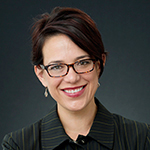 By Amy Butler
By Amy Butler
Listening to a friend share devastating medical news this week, I sat listening and found myself unable to come up with any helpful or even appropriate response. Thoughts flashed through my mind as if on repeat film loop on a big movie screen: this is not fair; why is this happening?; this person is good and kind — not a person who deserves this.
One after another, they ran through my mind, pulling me into a cyclone of increasing outrage. Why do bad things happen to good people?
All of the sudden I realized that I am currently preaching on assigned lectionary texts from the Book of Job, getting up in front of hundreds of people every Sunday to parse the text, draw on every ounce of theological depth I can possibly remember from seminary, then tie it all together with a bow so that everybody who asks questions like I was asking earlier this week would feel a little better on their way home from church. Those questions were my questions, but when I planned this sermon series, I didn’t know I would be asking them.
There are many things wrong with this, including but not limited to an apparent disconnect between theory and practice in my own experience, and whatever pastoral fantasy I’d been nurturing that there is some way to tie a bow around the question of human suffering at all.
Preaching on the book of Job is a new sort of preaching for me at this ministry assignment. I work in a context where a strident gospel is generally the word of the week, Jesus’ perpetual call for us to do the work of ushering in God’s kingdom here on earth. The Job texts caught my attention for a bit of variety — what if I worked with these texts for a few weeks and preached more theology and personal faith? I wonder how messages of a more personal nature would sit with my people?
The response I’ve received from my congregation has been a bit startling. Hearing the suffering and injustice of the human experience voiced in worship seems to have opened a floodgate of connection. I’ve received the most beautiful emails and been approached for deep and thoughtful conversations, each detailing struggles to keep believing in the face of suffering, tales of well-meaning friends who have damaged faith, and that sinking, lonely feeling that God, if God exists at all, has totally and utterly abandoned us.
Turns out I’m not the only one asking these questions. And, strangely, this comforts me.
This week at the intersection of my own experience and the life of the community, I realized again what I have learned over and over along this adventure of being human and trying to live with faith: we do it all so much better together.
We need each other to witness stories of doubt and fear and pain, to listen when we need to voice the suspicion that God is unaware of our pain, or uncaring, or even non-existent. We need each other to remember we are not alone in our questions.
And some of us even need each other to listen and say, “Hey, haven’t you been preaching on that topic lately?”
